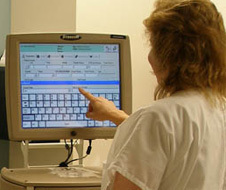by
Loren Bonner, DOTmed News Online Editor | October 04, 2012
Interoperability — the sharing of data — might be an ugly word, but it's a big concern in health care.
It's also something Patricia Katzman knows a lot about. Katzman is the director of interoperability and CDS marketing and strategy at Philips Healthcare. She spoke in Boston this week at this year's AdvaMed conference, an annual gathering of big players in the medical device industry, on a panel about how health care facilities are prioritizing health IT. DOTmed News spoke with her about how interoperability will affect patient care and what the major obstacles are to getting it off the ground. What follows is an edited transcript of the discussion.
DOTmed: How are new health care delivery models driving health IT?



Ad Statistics
Times Displayed: 46013
Times Visited: 1302 Ampronix, a Top Master Distributor for Sony Medical, provides Sales, Service & Exchanges for Sony Surgical Displays, Printers, & More. Rely on Us for Expert Support Tailored to Your Needs. Email info@ampronix.com or Call 949-273-8000 for Premier Pricing.
Katzman: Health care as an industry is not leveraging information in the way that other industries are leveraging IT and information — the banking industry, for example, where you can pay your bills online and see your account balance online. There is a need for more types of managed data and making use of them and getting participation from patients as well. The health care industry is such a highly regulated and sensitive industry when it comes to all this information, so there have been good reasons for not being eager to do this. So with the current administration and actions with meaningful use as part of the HITECH Act, and the efforts with ACOs [accountable care organizations], it's really about stimulating the industry that hasn't really been looking at IT as a way to actually improve health care and also reduce costs. If you leverage some smart systems, it can happen.
As hospitals realize the importance of data, why is interoperability key?
Interoperability has a lot of different definitions to different people, but it's simply the ability to share data. In itself this is not enough, if you think about it. It's still an overwhelming amount of information, so the real step we need to get to is the analysis, and the tools that can present information in a digestible way and an actionable way so a clinician can make a decision or a patient can make a decision. It's taking that data and processing it and analyzing it.
How can interoperability improve health care?
The computer can synthesize information from various sources — which is difficult for a human to synthesize — and give an alert that might show a patient is showing a condition that might need a little extra attention. That can assist a physician in preventing, let's say, a patient's condition from getting worse, and that might be life-threatening or really costly. This is just one example.

